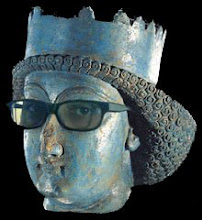
That quote is from the Princess Bride. I love that movie. Anywho...
So, I am sitting in class and we are discussing Hinduism yesterday and we get to the story of the Hindu god Krishna. He, in his youth, was known as a great lover. He would come down and seduce the milkmaids in the fields (and show them pleasures beyond pleasures... baw chika baw waw). As he matured, he fell deeply and passionately in love with Radha. It is tough to say whether this is a different god (or goddess) or just his female counterpart (balance is important in Hinduism) but she can be considered a separate entity. The interesting thing is, the other gods and goddesses (most at least) were married, Krishna and Radha were not because their love was to be the ideal form of love to which all humans should aspire. The reasoning is that once a couple is married, the love leaves.
I am also studying Love, Sex and Marriage in the Middle Ages this semester. We are looking at the views of these during Medieval Times (my Prof. might fail me because of that link!) and it is interesting how many views support stereotypes that we have of the Middle Ages and how many throw those stereotypes out the window.
There is a lot that the church has to say on the subject of marriage in those days because that is when marriage as we know it today (especially within Christianity and the Christian West) was truly defined. The arguments centered around when and how the actual sacrament (called this as early as Augustine and Jerome if not earlier) takes place. Is it at the moment of consent? Does it entail a sort of public pledge? Is it strictly a secular affair or does the church have involvement (the church maintained their control over marriage while the state saw marriage more as a contractual agreement)? Does consumation have any bearing on the validity of marriage? Can you marry a relative and, if so, how far removed do they have to be (this was an important question... especially to royalty)? Ultimately, the church began putting lots of restrictions on marriage as well as sex in marriage. There is a theology that marriage is fundamentally different after the Fall. In Eden, marriage was instituted by God, but sin corrupted marriage to the point that celibacy was the ideal life and marriage was only necessary to keep people from sinning because of their lust. Interesting way to view something known as a "sacrament" don't you think?
So, on the ecclesial side, we see sort of a prudish attitude towards marriage developing out of three things (in my opinion... I need to do more research on this but this is a preliminary statement): the church's teaching of the higher state of celibacy, the church's desire to extend more control into civil matters, and the church's attempt to define proper Christian behavior.
However, on the secular side we see something very different. We see a similar attitude to that of Hinduism. Unmarried love is far more passionate and true than anything we see in marriage. The Arthurian Romances repeat this theme over and over again, as do the Lais of Marie de France. Every example shows (of course only beautiful and noble... meaning upper class... people are the subjects of these stories) someone in an unhappy marriage finding the love of their life and entering into deep passionate physical behavior (wink wink, nudge nudge) with their new love. Often, these arrangements don't end well, but that furthers the theme that true love cannot last. In fact, that is something that is said repeatedly in the Princess Bride but the movie attempts to quell that thought. But, sometimes they work out for those lovers. The example of failure in love is Lancelot and Guenivere. Tristan and Isolde offers a couple of scenarios... mostly bad but some end well (the story is so old that there are many different versions, but it is the quintessential love story as well as the oldest in Europe of the time... many other stories quote or refer to Tristan and Isolde).
The point is, what is marriage? Is it possible for passion to remain? Is marriage even supposed to be based on love or is it simply to relieve the burden of sin or to align families in civil contract? Why do we base our feelings of love today on pure passion (as the medieval romances seem to do) when we also seem to think that passion ALWAYS dies within the context of marriage (as Krishna and Radha's example seems to say)?
Tomorrow, I will further explore marriage today and discuss, based on some of the history of marriage in the church as well as secular, whether our views on marriage and who can and should be allowed to marry are actually faulty. Yes, gay marriage will be talked about, but so will the concepts of pre-marital counseling, the sacramental nature, marriage roles, etc.


No comments:
Post a Comment